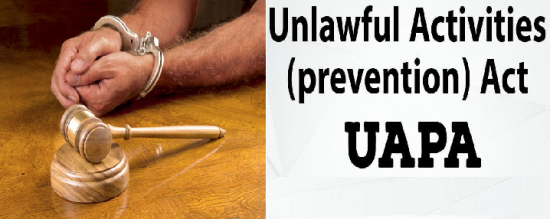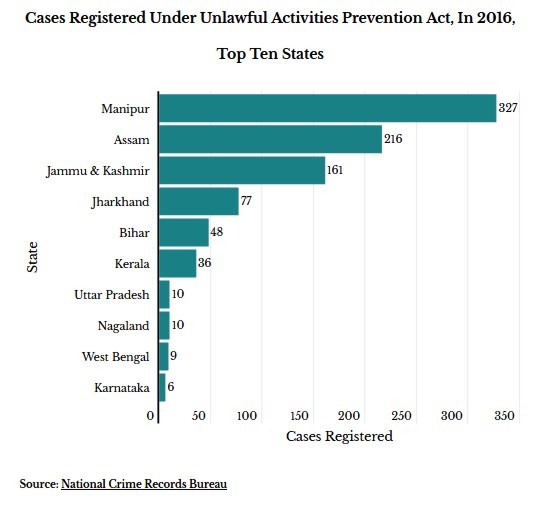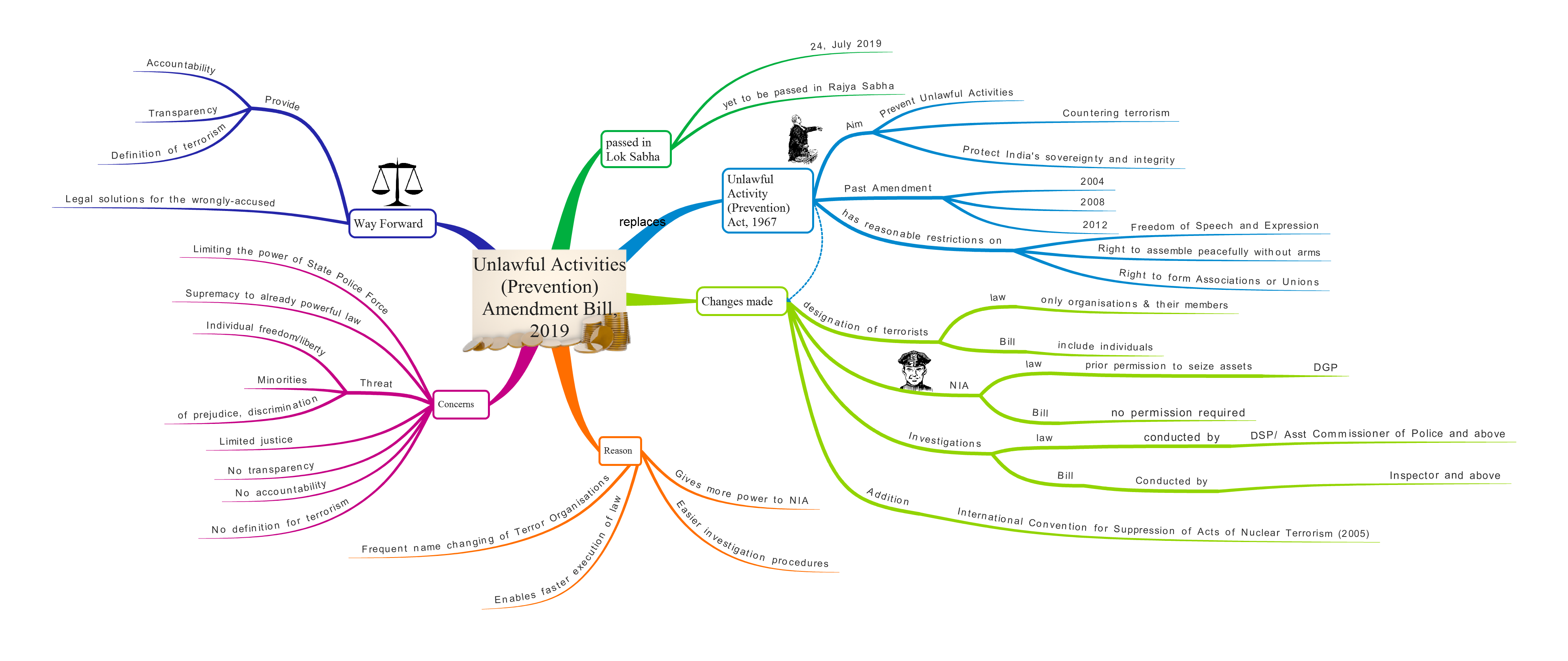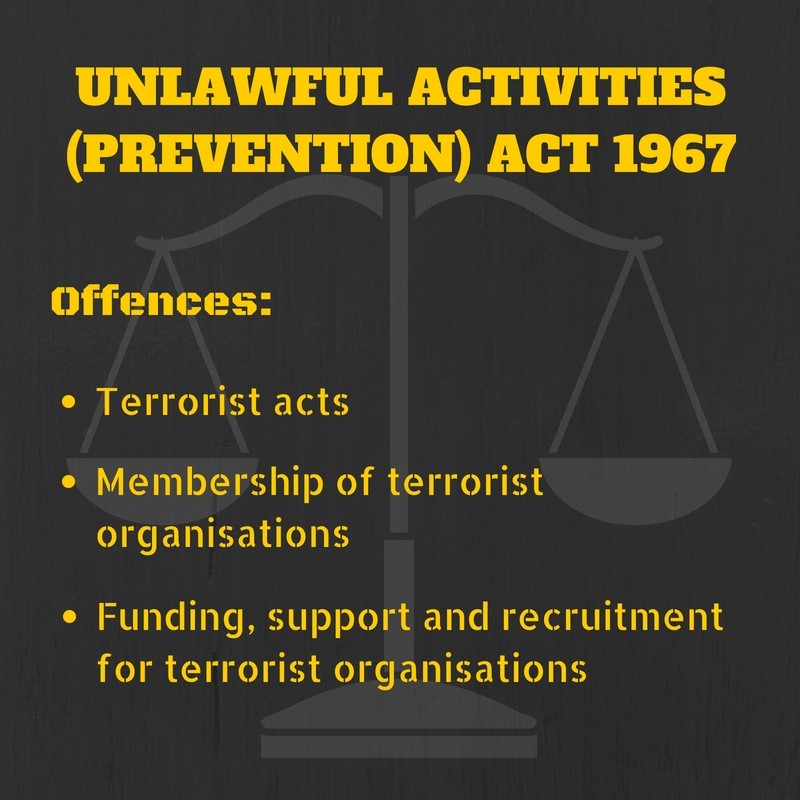Unlawful Activities (Prevention) Act – What is the Controversy?

On July 24, 2019, the Lok Sabha has passed the Unlawful Activities (Prevention) Amendment Bill, 2019. This bill, if made into a law, will replace the already existing Unlawful Activity (Prevention) Act, 1967.
Ever since its presentation in the lower house, this bill has been a subject of controversy. This bill is considered by some to be draconian in nature.
According to Amnesty International, the act once amended can designate any individual a terrorist, thus violating international human rights laws and opening the floodgate of harassment of the Human Rights defenders and activists.
What is the Unlawful Activities (Prevention) Act, 1967?
- This is a law that aims at preventing any unlawful activities by any associations that might jeopardize India’s sovereignty and integrity.
- The Unlawful Activity here means any actions by an individual/association that involves activities that might promote disruption of territorial integrity and Sovereignty. On 2004, terrorist acts are also included within the unlawful activities.
- This law provides reasonable restrictions on:
- Freedom of Speech and Expression;
- Right to assemble peacefully without arms;
- Right to form Associations or Unions.
- These restrictions were based on the recommendation by the Committee on National Integration and Regionalism that was appointed by the National Integration Council.
- This law was amended thrice in the past – in 2004, 2008 and then in 2012. The 2012 change was made after the infamous Prevention of Terrorism Act, 2002 that was withdrawn by the parliament.
- And now, Unlawful Activities (Prevention) Amendment Bill, 2019 if passed in Rajya Sabha, will cause further changes in the Unlawful Activities (Prevention) Act, 1967.
What are the changes made in Unlawful Activities (Prevention) Amendment Bill, 2019?
- In the existing law, only the associations/groups are termed “terrorist organisations”.
- In the new bill, individuals can be designated as terrorists.
- In the existing law, the National Investigation Agency (NIA), established under NIA Act 2008 must have prior permission from the Director Generals of Police before seizure or attachment of properties.
- This bill gives the power to NIA to approve of the seizure or attachment of the property without any permission from the DGPs.
- The existing law states that the power to conduct investigations on cases related to UAPA rest with officers of the rank of Deputy Superintendent or Assistant Commissioner of Police and above.
- The new bill provides this power to officers of the rank of Inspector and above.
- The changes are not made on aspects related to arrest and bails.
- International Convention for Suppression of Acts of Nuclear Terrorism (2005) has been added in the amendment.

Why this proposed change?
Change in the name of Terrorist Organisations:
- It was argued by the government that when an organisation is designated as a terrorist organisation by law, then the members disperse to form a new organisation under a different name.
- Thus, designating all the individuals involved as terrorists will help the government prevent future activities by the members of the organisation.
Easier Investigation Procedure:
- The proposed bill allows NIA to take rapid, efficient and fast-paced investigations as they are free from taking permissions from DGPs before the seizure of properties of the accused.
- Through the existing law, it is difficult to obtain permission from several DGPs without the knowledge of the accused.
- This resulted in them transferring their properties ensuing in an inefficient and slow investigation.
A wider range of investigative power:
The amendment allows Inspectors of NIA, who are at the rank lower than that of the Deputy Superintendent/ Assistant Commissioner of Police to conduct investigations related to the unlawful activities. This gives wider converge on the crackdown of the terrorists.
What are the concerns with regards to the amendment?
- Branding anyone a “terrorist” without any formal judicial process: This law empowers the investigating officers to designate any individual a terrorist. Any individual who is, either knowingly or unknowingly, is associated with a terrorist organisation, he/she can be deemed terrorist by the Government if it believes the individual is involved in the terror activity.
- Limited justice for the accused: The accused can make an application to the Central Government for de-notification, which will be reviewed by the Review Committee, which consists of the government officials themselves.
- Giving supremacy to already powerful UAPA, 1967: The existing law allows the government to punish any individual associated with the terror organisation by providing funds or raising support to that organisation as per sections 38, 39 and 40 of UAPA.
- Branding an individual as a terrorist without legal consequence or defence: Anyone who is designated as terrorists need not have legal repercussion per se. However, the Government, through this amendment, need not be accountable for the wrong accusation. The accused on the other hand will face social problems like job loss, hounding by the media, etc.
- Individual Freedom/Rights under question: This amendment poses threat to different individual viewpoints of the citizens.
- Vague and Unspecific: The State can brand any outfit or an individual a terrorist if it/he/she commits/participates in acts of terrorism or prepares for terrorism or involves in the act of terrorism. There is no fixed definition of terrorism: This means the amended provision give Government wide-ranging authority to assume what it feels to be an act of terror.
- Curtailing the powers of the State Police Forces: Police is a State subject. The new amendment gives NIA to directly seize the victims’ property without prior legal procedure. This limits the State police’ authority over their jurisdiction.
- Target minorities: These laws will be a threat to minority sentiments and ideas.
- Discrimination and prejudice: These laws might reduce the scope for fair investigations.
Way Forward
- Transparency: The government must undertake structural change to provide transparency in the proceedings to be accountable to the actions related investigation of the terror activities.
- Clear Justification: The Government must give proper justification to the seizure of the properties/assets of the individual so that it wouldn’t tempt the authorities to undertake illicit seizures of the properties of the individuals.
- Accountability of the Authorities in-charge: The procedure must be restructured in such a way that those who are in charge of the investigations will be accountable to any unjust negative consequences that may occur during the investigations.
- Definition of terrorism: An unprejudiced, non-discriminatory and just definition must be given to solve the problem of terrorism and avoid unjust practices.
- Legal Solutions: The bill must give judicial solutions to the wrongly-accused to safeguard the freedom, dignity, and equality of the individuals.
If you like this post, please share your feedback in the comments section below so that we will upload more posts like this.



